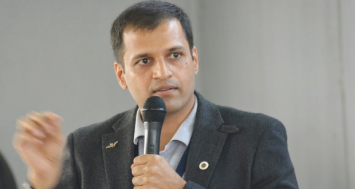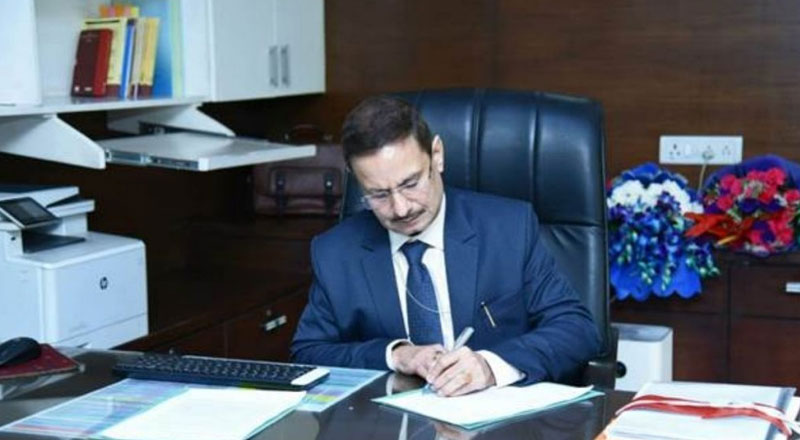If you have ever travelled to the city of Bangalore, you might have come across frequent traffic congestions and long jams, but the worst are the potholes on the city’s roads that are said to have even claimed a few lives. Having found a solution to this perennial problem, Prathaap Bhimasena Rao, Founder & CEO, Ground Reality Enterprises, popularly known as POTHOLERAJA talks about the initiative that aims to alleviate this issue with the help of like-minded friends and colleagues –
What inspired you to come up with an initiative like POTHOLERAJA?
After having travelled around the world, a common pattern emerged when people said, “oh you are from India, Bangalore, nice country, nice weather,” but most of the time ended with a statement “but your roads are horrible and traffic is nonsense.”
I personally have had many close friends and relatives who were personally impacted through road accidents and more so from potholes. My close friend lost his daughter in a pothole accident; my office team member broke his leg and arm; many other incidents which has been a common alarm.
My own social bug which is directly connected to my personal vision of “Live, Love, Learn and Leave Legacy” has been constantly the anchor for me to start researching and doing something for the society. I hope to see this vision of “Making Indian Roads pothole free and fix any within 3 -5 days” live beyond me.
How do you mobilize the funds required for such an initiative? What is the mechanism followed in carrying out such an activity of amending a pothole?
For public roads, as of now my own personal money, friends and some support from employees of corporates are the source. Small start has happened where few companies have started to engage their CSR initiatives along with employee engagement for fund raising, cultural events with fund raising element, volunteering to identify and fix potholes in and around their office areas has started.
For private roads, the associations, companies, builders, and facility leaders are themselves funding as it’s their own property that needs roads to be pothole free.
The process that I follow to fix a pothole –
Identification
1. Identification of potholes is the key, which I am asking the public to send a picture and GPS location of the pothole to a mobile number using WhatsApp or SMS to +91 814 POTHOLE (768 4653).
2. I also have a mobile app to spot and know the exact spot with pictures. I use that for my team as public and others tend to not utilize the app. A simple mobile number +91 814 POTHOLE suffices the purpose for most
3. You can see all potholes reported with live status on https://www.potholeraja.com/live-potholeview
4. We can also fly drones to spot potholes if its large areas
Mobilizing Resources
Once we have the identification, we then mobilize resources, funds for fixing them using the local people around these areas of potholes.
Fixing Process:
I studied and researched the methods people around the world use for fixing potholes. Many use the traditional road laying process even for potholes and hence it’s cumbersome and costly. I am told that the current road laying process used is almost 70-80 yrs old method which has not been changed, in spite of latest and innovative material and methods being available.
I changed to cold asphalt based pothole fixing rather than hot and other traditional methods. As I use cold asphalt to fix potholes, I do not need any large machine, too many people, and also no impact to environment as there is no heating and traffic blockage. We just need 2 people with very basic tools like sweepers, brooms, hand tampers and shovels.
As the cold asphalt is available in 50 KG bags which can be carried in a car boot, it’s very easy to transport smaller quantities with no wastage of material. This cold asphalt is also eco-friendly and uses plastic waste as one of the binding material. It takes 10-15 mins for cleaning and making the pothole ready, and 10-15 mins for pouring cold asphalt and tamping it. Within 30-45 mins a pothole is fixed and immediate traffic can be opened.
Generally the cold mix can be stored in bags for upto 10 months whereas hot asphalt mix is only for 4 hours shelf life. The fixed pothole has a life of over a year if the base road is of good quality; else we give warranty of 5-6 months based on the road assessment.
What kind of support do you receive from local municipal authorities?
As of now it’s been just my own efforts and sustainability drives. There is yet no support from local authorities or govt. or Swacch Bharat Abhiyan funds.
Are you looking at involving any local level NGOs or self help groups?
I am involving NGOs and self help groups to create awareness, use and enable them to do more. I do education on road safety, pothole management, do it yourself model and public private partnership. I also published a book “Performance Excellence -Efficient and Effective Project management in Social Organizations” Which is also a tool for NGO and social entrepreneurs to see how to use business and project management skills in social work.
The latest news also says about you recruiting transgenders for this noble act. Could you throw some more light on it?
This has been my constant work to empower and support transgenders. They are extra ordinary human beings and they need that support to come out of the stigma. I am happy to see few transgenders who have come forward and supporting me in this pothole filling act. They are also happy to see an alternative career and profession than their current. This is just a start; we need lot more people to take this as main stream work and profession and I am looking at giving as much possible work and remuneration as possible. I pay Rs. 500 per day (less than 3-4 hours a day of work) for their support. Which I believe is on par with any other daily wage payment that a male or female worker gets.
Once we have constant and regular work, we can look at much more support and other benefits. I also have group insurance in the company, so that if there are any incidents that need immediate attention, insurance should be able to cover.
What kind of challenges have you experienced so far in your initiative?
There are many challenges to cross, but I am enjoying this journey to see happy faces, less and reduced accidents and deaths. Challenges like locations of potholes, public awareness, reporting of potholes, availability of material when needed, cost of material, resources availability, media and other support, companies’ contribution and support from government/local authorities. All these are part of the journey I believe as each of the stakeholders has a power play in making the vision come true.
People have been supportive and encouraging, though many still hold the myth that roads work are all to be done by govt. and local authorities, we just pay tax and do nothing. I am working towards making that belief change to, yes I can also be supporting govt. / local bodies with my own small contributions through reporting, participation, funding, encouraging and positively supporting people who wants to do something.
What will be your roadmap in taking this initiative to the next level? What according to you would be its success factor?
With my vision for the next 15-20 yrs being very clear and the road map for that vision is well laid out, my immediate 3-5 yrs mission are:
• Enable and empower transgenders to take this as an alternate profession
• Create awareness and change the belief in public that I can also be socially responsible citizen and add value to society through participation, contribution and supporting
• Have commercially available “Do-It-Yourself” Kits for ensuring road safety – potholes, signboards, zebra crossing, markings, cleaning and other self-help tools.
• Make all the metro cities pothole free and fix any within 3-5 days
• Have all private properties to take this approach and make their properties pothole free and fix any within 3-5 days
• Capitalize CSR funding to make our roads pothole free and safer.
• Have this as a critical part of employee engagement initiative in min 1000 companies.
Samrita Baruah
samrita@varindia.com





